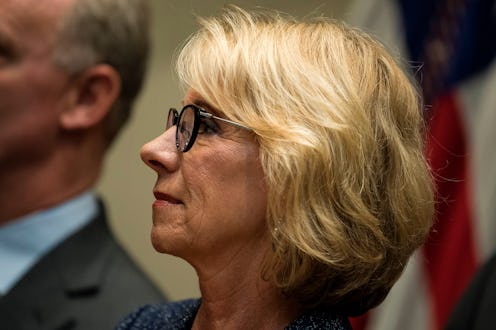News
Where Title IX Goes From Here

On Thursday, Education Secretary Betsy DeVos announced that the Trump administration will "launch a transparent notice-and-comment process" regarding Title IX, the law that prohibits gender discrimination in public schools and establishes guidelines for how universities must handle sexual assault accusations. DeVos strongly criticized the law and its current implementation — but it's not actually clear what will happen next with Title IX, as DeVos' speech was relatively light on specifics.
"The truth is that the system established by the prior administration has failed too many students," DeVos said. "Survivors, victims of a lack of due process, and campus administrators have all told me that the current approach does a disservice to everyone involved. That's why we must do better, because the current approach isn't working."
Throughout her speech, DeVos repeatedly drew an equivalence between sexual assault victims on the one hand and students falsely accused of committing sexual assault. Although she didn't explicitly say this, her implication was that false claims of sexual assault are just as big of a problem on college campuses as actual instances of sexual assault, and that the Obama administration's implementation of its Title IX guidelines has exacerbated this problem.
"Instead of working with schools on behalf of students, the prior administration weaponized the Office for Civil Rights to work against schools and against students," she said. "Rather than inviting everyone to the table, the Department insisted it knew better than those who walk side-by-side with students every day. That will no longer be the case."
Around 23 percent of undergraduate college women are sexually assaulted at some point while matriculated, according to RAINN. Although statistics on false allegations are difficult to come by, a 2010 study of assault allegations at a major northwestern university concluded that 2 to 10 percent of rape accusations were false.
DeVos also criticized the Obama administration for using Title IX to investigate sexual harassment claims, arguing that it did so in too broad a fashion.
"Any perceived offense can become a full-blown Title IX investigation," DeVos said. "But if everything is harassment, then nothing is. Punishing speech protected by the First Amendment trivializes actual harassment. It teaches students the wrong lesson about the importance of free speech in our democracy. Harassment codes which trample speech rights derail the primary mission of a school to pursue truth."
And yet DeVos didn't actually announce any policy shift the Trump administration will be taking with regard to Title IX. The closest she got was when she said that there will be a "notice-and-comment" process surrounding the law, which involves an agency publishing a proposed rule change in the Federal Register and opening it up to public comment. But as of now, it's unclear what exactly those proposed rule changes will be — let alone whether or not the Department of Education will implement them.
It's clear that Trump disapproves of how the Obama administration handled Title IX. This may well result in some policy changes surrounding the law, but what exactly those changes will consist of remains to be seen.